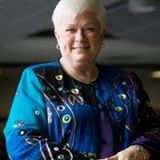 As a founding member of Women & Hi Tech, Jo Basey was one of a core group of women who agreed twenty years ago to take action against the implicit bias they saw in the STEM community around them. “The original intent was to involve, recognize, & promote women in STEM. There were roles we knew women were not getting recognized for taking on, and not getting promoted into because it wasn’t believed women could fulfill them.” Today, Basey remains an emeritus member of the board of Women & Hi Tech, where she feels her role is as a guide to help the organization keep focused on that mission.
As a founding member of Women & Hi Tech, Jo Basey was one of a core group of women who agreed twenty years ago to take action against the implicit bias they saw in the STEM community around them. “The original intent was to involve, recognize, & promote women in STEM. There were roles we knew women were not getting recognized for taking on, and not getting promoted into because it wasn’t believed women could fulfill them.” Today, Basey remains an emeritus member of the board of Women & Hi Tech, where she feels her role is as a guide to help the organization keep focused on that mission.
“We have come very far in twenty years, but the girls we reach with events like Ignite Your Superpower and Passport to Hi Tech certainly aren’t stepping into management positions or joining the C-Suite of a company any time soon,” Basey points out. “For a while in the nineties, you could point to ten or more large Indiana companies with female CIOs. Now, it’s gone down again. Is that because women aren’t choosing those roles? I’m not sure. But if barriers exist, we need to continue to help raise awareness and break them down."
"When we aren’t at the board table, that means our perspective isn’t actually being included.”
Basey’s own career in STEM was not along a traditional linear path. As the oldest of five children, when she graduated high school, she had acceptances to study pharmacy at both Purdue and Butler. “But I was ready to get married, and five years of school just seemed like too much.” So, Basey got jobs in three different research centers at Indiana University, and didn’t start college until her youngest child entered kindergarten. “I had bosses that would not let me off work to go to school. It wasn’t like it is today. I had to make up any time I took off.” Jo described the hard work of carrying a stack of FORTRAN computer cards between campus buildings in the middle of the night to check her programming work. “My husband would say when I was crawling in bed at 2am, ‘What are you doing? You know you have three kids? You know you have to be at work at 8am?’ But I was determined to do this.”
Though Basey’s studies for her business degree involved learning computer programming, she never ended up working an IT or technical job. The Indiana University MIS research center where she worked was able to stretch five years of funding from an IBM grant into eight while they were developing The Information Management Affiliates Program. Kelley School of Business decided to keep those efforts as part of the Indiana Business Research Center. This early coalition focused on helping IT decision makers deal with pressing issues in their fast-changing field. “I’m not tech savvy so to speak, because I never had to apply it myself. I was staffing the programs to teach executives what they needed to know. I listened to the membership as to what kept them awake at night, what topics were on their list of worry and why? We then found the people the best at solving those issues, because they had already tackled them. They had success or failure stories to share. Our approach was, let’s come together and talk about this stuff, not reinvent the wheel.”
Basey’s experience with building contacts and her network of connections are part of the foundation of Women & Hi tech today. “In the early years I helped identify not only speakers for our forums, and potential corporate sponsors, but also suitable board members.” Jo also served as Women & Hi Tech’s treasurer for seven years, where her talent stretching a budget would find more application. “One of our first goals we achieved was hosting the Leading Light Awards, the first one in affiliation with Lilly Women’s Network and Women in Business. We didn’t give any scholarships or awards—just paying for the food was scary enough. But we kept doing it. Today, there’s a heck of a lot more of a cushion to be able to do things like the $20,000 in scholarships we are giving away at the anniversary celebration. The increases in corporate membership are allowing us to do good work that will make a difference in the lives of undergrads, graduate students, and professional women who all need dollars to further their education in STEM fields.” In 2018, Jo herself was recognized at the Leading Light Awards as a recipient of the inaugural Gustafson-Miller Change the Landscape Award, named in honor of two other founding women of the organization.
Jo says that in twenty years, she plans to be rolling up the ramp with her walker to attend another Leading Light Awards, one she hopes will fully reflect Women & Hi Tech’s deep impact on the STEM landscape. “In 20 years, I want to be able to point to things happening in politics, in university leadership, in the c-suites of private companies and say—we were part of that.”
LinkedIn